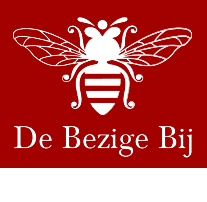History
The company was founded illegally in 1943, during the German occupation of the Netherlands by Geert Lubberhuizen [ nl ]; its first publication was a poem by Jan Campert called De Achttien Dooden ("The eighteen dead"), which describes the execution of 15 resistance fighters and three communists. The poem was sold to raise money for Jewish children who were placed with Dutch families; when it was published, in the spring of 1943, Campert had already died in the Neuengamme concentration camp. [3] When the German occupier rounded up students for the Arbeitseinsatz, Lubberhuizen hid in the attic of Maarten Vink, a surgeon, and ran the press from there. [4]
The name is derived from one of Lubberhuizen's aliases, "Bas." After he had signed a note, "Bas (busy)," an English-speaking friend joked, "Bas, busy as a bee can be," which led to the current name. [4] [5]
In 1997, De Bezige Bij became part of the Weekbladpersgroep, though it was to keep its editorial independence and its cooperative structure. [6]
In 2020, all employees of the Thomas Rap publisher left De Bezige Bij for more autonomy. [7]
This page is based on this
Wikipedia article Text is available under the
CC BY-SA 4.0 license; additional terms may apply.
Images, videos and audio are available under their respective licenses.
